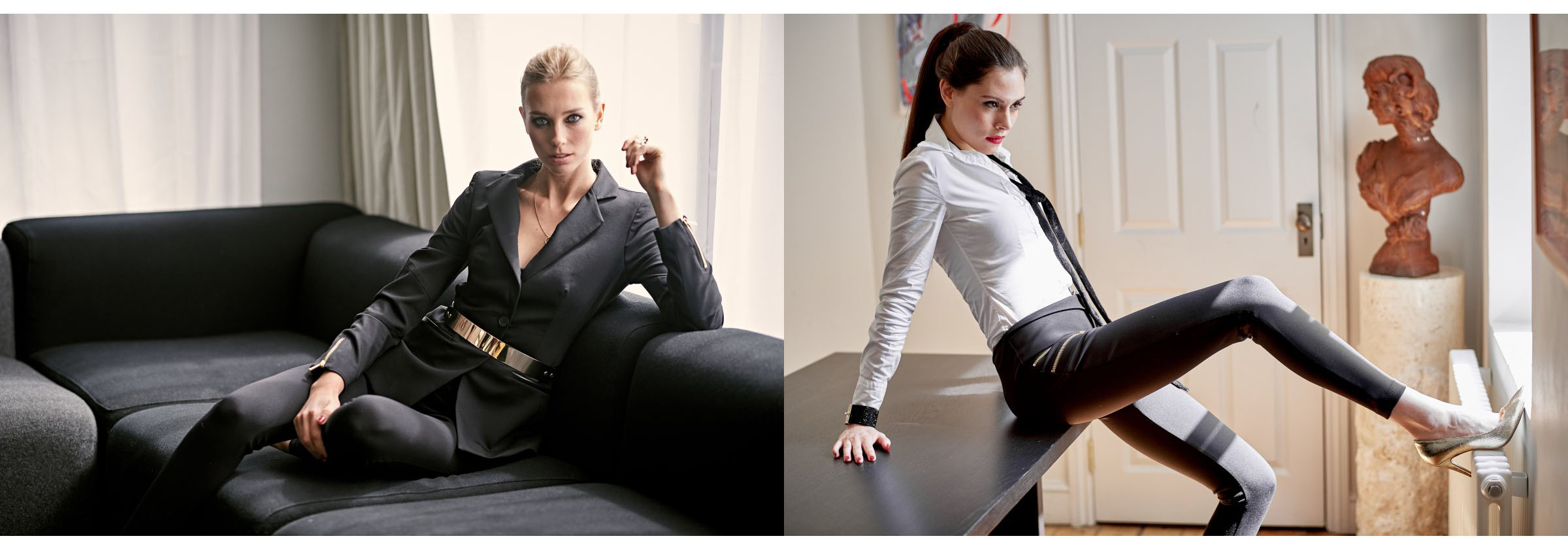LCF students from different masters programs worked this year on a project with URBAN GILT as part of the Collaborative Unit. The womenswear label recruited a group of 6 postgraduate students to support the relaunch of the brand, creating a digital and branding strategy to promote its new collection. On a recent interview with Lisa Moore and Hadrian Thomas, founders of URBAN GILT, they told us about their experience working with LCF postgrad students and how industry partners can benefit from joining the Collaborative Unit.
Hi Lisa and Hadrian, congratulations for the brand relaunch! Why did you decide to get involved in the Collaborative Unit for this project?
We had been to some talks at LCF and after one of the events we talked to some of the college's staff who mentioned the Collaborative Unit, and how it could be really beneficial for us to work with them. We’d also spoken to two other businesses who had worked on Collaborative Unit projects — both recommended it and one of them even went on to hire one of the students working on the project as they were such a good fit.
What was the students' mission for this project?
The project was to support our brand relaunch with a new range of clothing beyond our existing T-shirts. We wanted the Collaborative Unit team to help us rebrand too, so that meant we needed brand analysis, social and digital marketing, imagery, video, retail and written content support. We had a team of 6 plus their supervisor working with us and they covered exactly what we needed.

How did you find the experience of working alongside postgrad students?
The team working on the project were highly motivated and had plenty of industry experience already. At no point did it feel like we were working with students. It was great to have people looking objectively at our business and bringing an outsider’s perspective with new ideas. The team were super professional and great to work with.
What type of support did you offer the students through their project journey?
It’s important to say that the team, being postgraduates and having experience already, were self-starters and didn’t need anything from us apart from direction as to where we wanted to take the brand. With each part of the project we created an initial brief along with any supporting materials and showing what deliverables were required. For instance, for the videography we created a mood board showing video styles and a script, which we presented to the team and then let them take over. We took care of the administrative parts like hiring locations and models so they could focus on the more creative aspects.

What key skills should students bring into a collaborative working environment?
Being professional is the most important thing. That means communicating on time, making sure it’s clear what will be delivered and when. Our team worked really well together and it felt really natural. But it’s important not to take that for granted. A team leader who can communicate with the industry partner instead of having to speak individually with each member and keep everyone up to date is really important too.
From an industry perspective, do you encourage students to participate in this type of opportunities?
There’s no question it’s a good thing to work with industry partners while still in education. For a start, it shows that you’re motivated and proactive, which is a real bonus to a business, especially a business in the early stages like ours. We’ll make sure their work is recognised and will be more than happy to give them recommendations wherever necessary. Also, it’s a great place for them to feel like they can make mistakes and learn.

How do you think industry partners can benefit from participating in the Collaborative Unit?
There’s no way we could have achieved the outcomes of this project by ourselves. We had access to a team of 6 people all overseen by an industry expert with a background in luxury fashion. That’s a knowledge pool that any business would be lucky to have access to.
There are also plenty of advantages to having new people in the team not only because they bring a fresh perspective with a unique knowledge base but we were able to learn plenty from them too - not least because our team had grown up with social media, which turned out to be really useful. I’m sure that would be the same for any industry partner.
What piece of advice would you give to students who take part in industry projects?
Working with an industry partner, you’re working with someone who wants your help but it can also be a two-way thing. As a student, asking the right questions will give you inside information, like finding out what would make you a more appealing employee or how to do a job well. That kind of access can put you ahead of others when looking for jobs. Obviously, it’s difficult as a student because you’re focused on finishing your degree, but if you use the time wisely it can pay in the long run.
- Find out more about Collaborative Unit at LCF
- Do you want further your studies with us? Explore postgraduate courses at LCF
- What’s on at LCF: open days and events
- LCF is Global
- More LCF Stories

